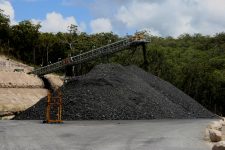Court Blocks Hunter Valley Coal Mine

The recent decision by the Land and Environment Court of NSW to reject an application to build a coal mine in the Upper Hunter Valley has been hailed as “momentous” and is expected to be “profoundly influential” on future projects which have a significantly adverse impact on the local environment.
Chief Justice Brian Preston dismissed the appeal by Gloucester Resources Limited against a 2017 decision by the Department of Planning and Environment to refuse the mine, summing up the proposal as “in the wrong place at the wrong time.”
Original application
The NSW government initially rejected the application by Gloucester Resources to build on open cut mine due to its impact on the town of Gloucester, north of Newcastle.
The project would have resulted in 21 million tonnes of coal being extracted over a 16-year period, just a couple of kilometres from the boundaries of the town.
Justice Preston made clear that he took into account both the environmental and social impact of the project, noting that 90% of the overall submissions and 83% from Gloucester opposed the development.
Concerns ranged from the noise and dust to the impact on the beauty of the area and on the environment in the Hunter generally.
The Environmental Defenders Office (EDO) joined the case last April, representing a group of concerned community members who call themselves Groundswell Gloucester.
The EDO and NSW government made submissions that the mine’s detrimental impact on the social fabric of the local community and on the environment outweigh commercial considerations.
Justice Preston agreed, remarking that “An open cut coal mine in this scenic and cultural landscape, proximate to many people’s homes and farms, will cause significant planning, amenity, visual and social impacts”
Perhaps of even greater significance is the weight his Honour placed on the potential impact of the project on the environment.
“The GHG [greenhouse gas] emissions of the coal mine and its coal product will increase global total concentrations of GHGs at a time when what is now urgently needed,” he remarked.
“In order to meet generally agreed climate targets, is a rapid and deep decrease in GHG emissions. These dire consequences should be avoided.”
Compliance with the Paris climate change agreement
The EDO made submissions to the effect that a relevant consideration is Australia’s commitment to the Paris climate agreement.
In that regard, his Honour noted that the agreement contains “no proscription” on the approval of new emissions sources such as coalmines, approval of the project “cannot assist in achieving the rapid and deep reductions in GHG emissions that are necessary” to meet the agreement’s objectives.
Justice Preston was not persuaded by the argument made by Gloucester Resources that emissions from the mine would represent only a small fraction of the global total.
“The global problem of climate change needs to be addressed by multiple local actions to mitigate emissions”, the judge stated.
Climate change activism
The judgment has been seen as a form of climate change activism by the judiciary.
But few are surprised by the importance his Honour placed on combating climate change. In a 2017 address, the judge emphasized the central importance of planning and environmental law on enabling a transition to sustainable energy.
He said in his speech, “Climate change demands the transition from a fossil fuel energy dependent economy to a renewable energy dependent economy. The law will play an important role in either facilitating or delaying this economic transition.”
His Honour had also explicitly warned corporate Australia of a new wave of climate change litigation in a range of contexts, explaining that other country’s had seen its relevant in proceedings relating to the right to life and to a healthy and clean environment. “Such rights may provide a basis for climate change litigation” in the domestic context, he foreshadowed.
“The obligations of corporations and company directors are also being affected by climate change and the changing legal and policy framework to address climate change”, Preston remarked in his speech.
Landmark decision
The chief executive of EDO NSW, David Morris, called the decision “momentous” and predicted it would be “profoundly influential” upon applications for future fossil fuel projects.
And while the decision is not binding on future judgments, Mr Morris believes “It’s very difficult to see how any future coal project avoids the judge’s finding about this being the wrong time for it”.
Climate Council chief executive, Amanda McKenzie, also welcomed the decision, stating:
“The NSW Land and Environment court has effectively ruled that coal – just like tobacco and asbestos – is bad for us… I’m thrilled to see the law catching up with the science. If I was proposing to build a coal mine right now, I’d be feeling pretty nervous.”







